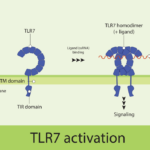In 2022, an international group of researchers reported the seminal finding that a gain-of-function variant of a single-stranded ribonucleic acid (RNA) sensor, known as toll-like receptor 7 (TLR7), can cause human systemic lupus erythematosus (SLE).1 The paper in Nature showed that a newly described variant of TLR7, identified in a child with severe lupus, was…


